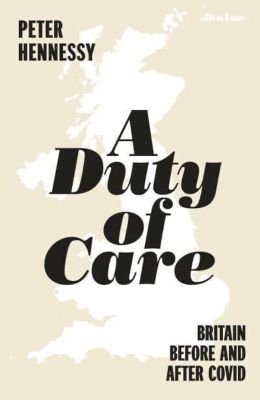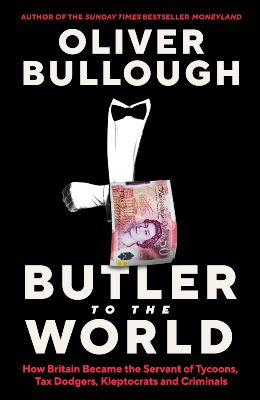John reviews two books dealing with important issues in UK culture – A Duty of Care and Butler To The World.
Community Support in the Shadow of Money Laundering
Although Covid-19 resulted in isolation, social distancing and separation, it did generate a renewed awareness of community responsibility and togetherness.
A Duty of Care
Firstly, in an insightful reflection on lockdown, Peter Hennessy’s A Duty of Care highlights how the motivation to help others has changed for the better. The author’s interactions and interviews with key political personnel highlight how many individuals went well beyond their expected roles.
He focuses initially on the period after the Second World War. The rejection of Churchill’s manifesto created the opportunity for the new Labour government to respond to people’s demands for social regeneration.
The basis of this push for change was the Beveridge Report of 1942. This report identified the “five giants” or foundations of the modern welfare state that society had to battle to promote greater equality, namely want, disease, ignorance, squalor and idleness.

A New Emphasis
As Hennessy states, “the new administration had taken on a monumental duty of care for the British people”. Welsh politicians such as Jim Griffiths and Aneurin Bevan played crucial roles in tackling social inequality. They promoted free secondary education for all and a national health service. The suggestions of national insurance, national assistance, Legal Aid, and the Housing Act also came about. All these initiatives aimed to reduce slum housing and create towns to accommodate the London “overspill”.
This 1945 post-war “Duty of Care” addressed slum housing and revitalised education. Additionally, there was a new emphasis on technical skills and alleviating poverty and economic issues. The author’s analysis of the attempts by successive governments and political leaders to promote greater social equality alongside conflicts makes for absorbing reading.
Readers may feel frustrated at how “party policy” restricted the effectiveness of policies. The chapters “Safe in Her Hands” and the “Brexit Effect” illustrate the ferocity of the debate. It challenged friendships, family relations and also political careers.
Life-Saving Vaccines
The author highlights how Britain’s Covid experience in 2020 was a “clear line in history” regarding authority figures and their adoption of “duty of care” decision-making and public scrutiny.
In particular, he draws attention to how scientists developed life-saving vaccines, the efforts of NHS staff, and how individuals dealt with grief, loss and isolation. The population showed care for others with “acts of kindness”, clapping on the doorstep, and volunteering.
This book is an outstanding and inspirational work highlighting how “Duty of Care” has been exemplified in historical terms. It also shows how the need has arisen for a “new Beveridge” in terms of social care, social housing, technical and technological education, artificial intelligence and climate change.
The author emphasises how we need to avoid political partisanship to progress. We hope the Truss government can meet the challenges facing social structures, the economy, poverty and the realm by emphasising “a duty of care”.
Butler To The World
Secondly, Oliver Bullough’s Butler to the World undertakes an unflinching investigation into how Britain became a haven for oligarchs, tycoons, tax dodgers, gangsters and kleptocrats (rulers who use their power to transfer or steal their country’s resources). This is in stark contrast to the positive message of individuals promoting a “duty of care”.

He illustrates how Britain has become an amoral enabler of money laundering. It also engendered kleptomania, sheltering wealth in property deals and making consultancy payments to politicians. These practices enabled individuals to gain status, recognition and, in some cases, political influence.
In the introductory chapter, Bullough unravels the complex nature of money markets and the influence of the “merchant banking elite”. In particular, he enlightens the reader on the strategies the City of London took to reinvent itself after the Midland Bank and the London-based Moscow Narodny bank enabled banks to earn profits from new sources.
The British Virgin Islands (BVI)
Readers may well find the leading role of the British Virgin Islands (BVI) amoral in the creation of shell companies and tax loopholes. These practices enabled kleptocrats and oligarchs to disguise their wealth. BVI companies became powerful entities that created discreet and affordable asset protection services, hiding illegal assets and avoiding taxes.
The chapter “Rock Solid” describes how Gibraltar prospered from gambling addiction in Britain’s most deprived neighbourhoods. Similarly, the development of supplemental liquidity providers encouraged investment into the British economy through fund management schemes, which became tax havens. As the author emphasises, Britain became the butler, the servant of the rich.
The text illustrates how Tanzania uses the same framework as the one established in Gibraltar and might be the tip of the criminal iceberg.

Down The Tubes
I am sure readers will find the actions of the Ministry of Defence in the chapter “Down the Tubes” infuriating. The MoD sold Brompton Road tube station to Dmitry Firtash and the consequent access to a host of underground stations. Described as the Kremlin’s man in Ukraine, he also has links to Gazprom and Putin.
Following gifts to Cambridge University, royalty and high society welcomed him with no apparent concerns about the origins of his wealth. The author considers that Britain has behaved as an amoral enabler, hiding the reality of its actions.
He points to the sale of “golden visas” to wealthy foreigners. The book also reveals how many of Russia’s most affluent and best-connected emigrants have a whole collection of mansions in London.
Bullough argues that “butlering” thrives because it has many influential supporters who countenance the non-enforcement of parliamentary rules. The book is an outstanding and, at times, mind-blowing exposition of how Britain has attracted and welcomed the wealth of legalised criminals.
Bullough highlights how Britain faces the consequences of the Russian invasion of Ukraine, control of gas pipelines and also how hidden wealth has created a new aristocracy.
The book discusses hidden wealth as a strategy for promoting influence and power within political and financial arenas, and highlights that “butlerism” offers no duty of care for the proletariat.
Finally, for more book reviews, click here.


